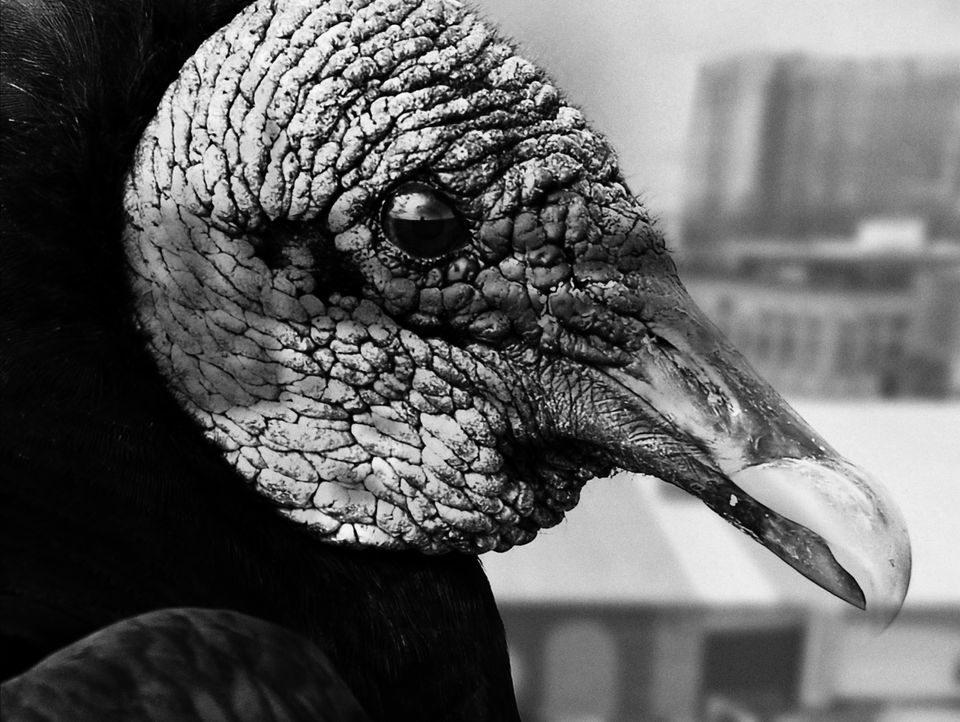A Rapture Both Lonely and Wretched

A vulture lives on the roof of the post office across the street. Its whimsy stick nest sits atop the antiquated antenna pole jutting from the roof’s flat expanse. The vulture never mothered any eggs that I saw; I assume because there was no mate for her in the neighborhood. This one settled five or six years ago, the spring after I’d arrived. My elderly neighbor downstairs had posted a notice by the building’s mailboxes when she first appeared: “Beware: Vulture spotted. Keep your cats indoors.” But vultures never feed on the living. They clean up the dead.
The vulture operates on a subconscious schedule more accurate than an atomic clock. Maybe she’s fallen into a routine, the motions of the diligent postal workers below her nest marking the passage of time. Or maybe there’s an undercurrent present in the neighborhood: some consistency, despite all the chaos and serendipity of daily life. As much as we watch the vulture, I’m certain she watches us right back, her black glossy eyes scanning the surrounding windows and balconies around her home.
At sunrise the vulture lays on her back; wings spread wide, beak to the sky, allowing the sun’s rays to heat her cruciform shape after the long dark night. She’s a black vulture, the inky skin of her bald face surrounded by a ring of feathers like a nun’s habit. When she’s contented with her nap she stands upright again as the early morning joggers have set off to their solitary races and she begins an exercise of her own: chicken feet clattering along the post office’s roof as she performs some subliminal path finding, zigzagging in an intricate pattern. She beats her wings rhythmically as the first postal workers arrive below, forming a chorus of industrious instruments as one drags the chain link fence gate across the concrete and another opens the rollup doors to welcome the first trucks of mail. While the children wait for the bus she teeters over the edge closest to their stop, perched in witness to the joy of youth below. The boys occasionally throw pebbles and apple cores up at her; she never moves, even when struck. She skips along the roof’s edge to watch the school bus charter away the children and remains on the corner closest to their departure for hours, gazing down the length of the street beyond. She’s drawn away from her anticipation when the French restaurant opens its doors for the lunch crowd, the scent of mirepoix and fresh bread turning her stomach. She leaves then, flying away in search of a lunch to her own fitting. As the yellow bus drives back down the street towards her square, the vulture returns from her outing. She circles in the thermals hundreds of feet above ground, keeping an eye on her children as they walk their little legs down the tall steps of the bus and onto the curb. Her circular flight pattern inscribes the square below and she watches each child toddle over to their respective apartment building. Only once they’re safely indoors does she land on her antenna perch and close her eyes until dark.
Time passes like that though the days grow shorter and the nights colder. She spends longer in the morning sun, she stands still more, her back hunched, chin nestled into her chest and her long wings wrapped tight around her torso. In snow, wind and rain she remains steady on the post office roof; when the weather abates she beats her wings in some act of defiance against the world she’s been set to live in. When lightning strikes at night her shadow form is revealed against the barren backdrop of the roof. She never flinches. Not even the most thunderous whip crack echoing from the sky can make her leave her roost.
The holiday season ramps up, mail trucks increase in traffic and the visibility is made low with sleeting snow. This Monday a little girl’s orange kitten is hit by a truck and left to lay prone on the snowy sludge in the street. The vulture breaks her morning ritual and in an instant is in flight, rising high into the sky to scope out her next meal. She circles the kitten from above, her nostrils drawn to the freshly spilt iron of a young creature. Before blood from the kitten’s small body can pool into the concrete, the vulture begins to spiral downward, picking up speed. She makes a silent dive to the ground, picking up the little cat in her toughened claws. She deposits her prey on the exposed flat of the post office’s roof and begins quick work on her meal, thrusting her black beak into the dead animal’s fuzzy orange stomach, ripping its tender flesh and breaking its ribs with a series of cracks. Blood drips from the vulture’s hooked beak in thick rivulets and pools around her claws. With her head turned slightly, kitten entrails dangling from her mouth, she looks at me through the window, my mouth agape and struck still. She smiles.